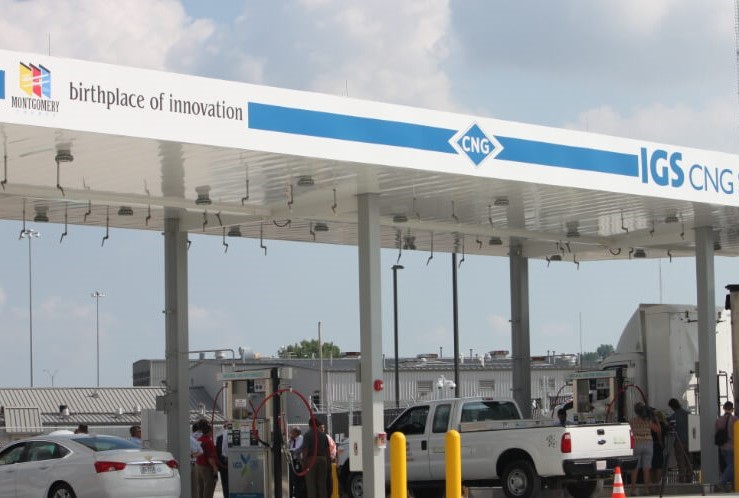For organizations managing large-scale facilities and vehicle fleets, including those in manufacturing, logistics, and municipal operations, every effort to improve efficiency, reduce costs, and support sustainability goals can make a meaningful difference. That’s especially true when it comes to fueling the vehicles that keep operations running smoothly.

Business owners, fleet managers, and drivers seeking greater efficiency are likely familiar with compressed natural gas (CNG), an alternative to gasoline and diesel that’s composed primarily of methane compressed to high pressure for storage and use in fleet vehicles. Making the switch to CNG may seem like an obvious step toward managing a fleet in a more environmentally friendly way, but is it cost-effective?
Comparing Options for Fueling Your Fleet
Both diesel and CNG have their advantages, and the choice between the fuels ultimately depends on the fleet’s operational needs, budget, and environmental priorities.
1. Cost
The price of CNG is typically lower than diesel and offers better price predictability. Since CNG is a gaseous fuel, it’s commonly sold in gasoline gallon equivalents (GGEs) or diesel gallon equivalents (DGEs). The price of CNG, not traditionally impacted by global oil markets, is significantly more stable, and natural gas, as a domestic commodity, has more hedging strategies available to fleets. Additionally, CNG engines burn cleaner, which can reduce engine wear and tear and offer a simpler aftertreatment system compared to traditional diesel vehicles today. All this translates to similar, if not lower, long-term maintenance expenses.
2. Vehicle Performance and Range
Diesel engines are known for their high torque and power—as well as a large range per tank of fuel—making them ideal for heavy-duty (class 7 and class 8) applications like trucking, refuse, and transit applications. While CNG engines historically have offered comparatively lower torque and power, which limits their use in heavy-duty or high-performance applications and makes them more attractive for lighter-duty fleets and urban driving, recent industry innovations have enabled the next generation of CNG engines to match the power and reliability of diesel at a lower cost. As an added benefit, CNG engines are significantly quieter than their diesel counterparts, making these trucks more friendly to your neighbors and providing a more pleasant driving experience.
Experts believe the new wave of CNG truck technology will provide a similar experience to diesel.
3. Maintenance
Diesel engines are durable and reliable but require regular maintenance, especially for emissions control systems, which can be expensive. CNG engines, however, tend to have lower maintenance costs because they burn cleaner, reducing wear and tear. There is also limited maintenance of the after-treatment systems compared to diesel.
4. Infrastructure and Security
Diesel fueling infrastructure is widespread and readily available, making it convenient for fleets operating in diverse locations. While CNG fueling infrastructure is steadily being built out across the U.S., more and more CNG fleets are considering the benefits of on-site fueling stations. Fleets can choose to invest in the CNG fueling systems themselves or partner with an organization to build, own, and operate on-site fueling options with no upfront costs.
5. Environmental Impact
CNG burns cleaner than diesel, producing fewer greenhouse gases, particulates, and NOx emissions. Modern diesel engines with advanced emissions controls (like DEF and DPF systems) are cleaner than older models but still emit more greenhouse gases and particulates compared to CNG.
Overall, CNG can be a more cost-effective and environmentally friendly option for fleets operating in areas with access to CNG refueling stations.
The Logistical Benefits of On-Site Fueling
The growing availability of CNG fueling stations, including on-site options, makes it easier for fleet hubs to adopt and operate CNG vehicles efficiently.
If your organization’s fleet follows the same route or returns to a central hub at the end of each day, it might be beneficial to consider on-site fueling. At IGS Energy, we install CNG stations along customers’ routes to ensure their fleets have consistent access to fuel, but for many customers, an on-site CNG station is the best choice. This option allows customers to more effectively manage what’s a typically unpredictable expense.
On-site CNG fueling stations can significantly reduce logistical challenges for fleet professionals in several ways:
- Convenience and time savings: Fleet vehicles can refuel directly at the facility, eliminating the need to travel to off-site fueling stations. This can reduce downtime and increase operational efficiency.
- Fuel availability: Assuming adequate natural gas is available on the street from your local utility, on-site fueling stations ensure a consistent and reliable supply of CNG, minimizing the risk of fuel shortages or delays from your trucks waiting in line.
- Cost control: Fleet operators can negotiate long-term CNG supply contracts, leading to lower and more predictable fuel costs compared to retail prices.
- Streamlined operations: Refueling schedules can be integrated into fleet operations, such as refueling during off-peak hours or overnight, reducing the time drivers spend fueling on the clock.
- Reduced administrative burden: On-site fueling simplifies fuel tracking and management, as all refueling happens in one controlled location, making it easier to monitor usage and costs.
Maintenance Facility Considerations
If you plan to have your technicians work on your CNG vehicles’ fuel system components, you may need to make some modifications within your maintenance facility to follow local codes for working on CNG vehicles indoors.
Unlike diesel fumes, which pool on the ground when released, natural gas rises. This means it’s important to follow NFPA 52 or similar local regulations. Most often, this involves monitors in the maintenance bays and certain types of HVAC systems.
If you’re building a new garage or considering replacing your HVAC system soon, it’s recommended to work with your engineer to select a system that’s already CNG-compatible. This way, if you do switch to CNG down the road, you’ll already have a compliant maintenance shop.
Overall, on-site CNG fueling stations can provide fleet and facility professionals with greater control, efficiency, and cost savings while reducing logistical complexities.
CNG’s Growing Role in Facility and Fleet Operations
Facility and fleet operators across the U.S. are making the shift to cleaner, more affordable domestic fuels like CNG, which are driven by cost, compliance, and environmental goals.
By switching to CNG, fleet hubs can achieve cost efficiency, regulatory compliance, and environmental responsibility, making it an increasingly attractive choice. Your customers will also see an improvement in their Scope 3 emissions calculations because of the decision to burn cleaner fuel. With an effective transition plan, the benefits of CNG don’t take long to materialize for businesses, facilities, fleet managers, and their drivers.

Dave Mrowzinski is vice president of CNG and biogas at IGS Energy.
